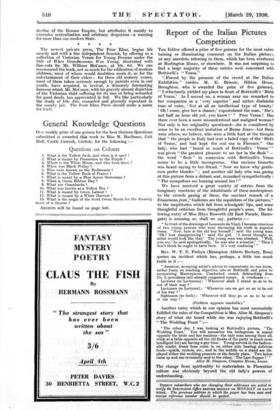Report of the Italian Pictures Competition 'THE Editor offered a
prize of five guineas for the most enter- taining or illuminating comment on the Italian !pictures, or .any anecdote referring .to them, which has been overheard at Burlington House, or elsewhere, It was not surprising to find a large majority of these- entries were concerned with Botticelli's " Venus."
".Forced by the pressure of the crowd at the Italian Exhibition " (writes M. E. Briscoe, Hildon House, Broughton, who is awarded the prize of five guineas),
I reluctantly yielded my place in front of Botticelli's Birth of Venus.' As I moved on, a woman near me remarked to her companion in a ' very superior ' and rather disdainful tone of voice, ' Not at all an intellectual type of beauty. ' Oh ! come, give her a chance,' expostulated the man, She's not half an hour old yet, you know ! ' " Poor Venus ! Has there ever been a more misunderstood and maligned woman? Not only is her originality questioned—she is considered by some to be an excellent imitation of Burne Jones—but there were others, we believe, who were a little hurt at the thought that " the people in Italy had sent a faded copy of the Birth of Venus,' and had kept the real one in Florence." One lady, who had " heard so much of Botticelli's Venus' was given " the greatest pleasure to see her in the flesh "- the word " flesh " in connexion with Botticelli's Venus seems to be a little incongruous. One envious brunette was heard saying to her friend, " Now we know why gentle- men prefer blondes " ; and another old lady who was gazing at this picture from a distant. seat, remarked sympathetically : " The mosquitoes are buzzing around her ! "
We have received a great variety of entries from the imaginary reactions of the inhabitants of these masterpiecei to the crowds gazing at them, the succinct remark of a Franciscan frate,"Galleries are the sepulchres of the pictures," to the ineptitudes which fall from schoolgirls' lips, and some thoughtful criticism from thoughtful people's pens. The fol- lowing entry of Miss Rhys Raworth (52 East Parade, Harm- gate) is amusing or, shall we say, pathetic
:- "In front of the_drawings of Leonardo.daYinei, I hpeame conscious of two young persons who were discussing his work- in superior tones. Now, here is the old boy himself I said the young man. Oh I how disappointing ' said the girl. ' I never thought an artist would look like that.' The young man was abashed. - ' Well, you see,' he said apologetically, he was also a scientist.' Then I don't think he ought to have been. It's very confusing.' "
Rev. W. T. N. Probyn (Brampton Abbots Rectpry, Ross) quotes an incident which has, perhaps, a little too much truth in it :—
" Amateur, accepting artist's advice to concentrate on one room, rather fuzzy on reaching objective, site at Botticelli end prior to memorizing Masterpieces. Conducted crowd, debouehing from No. 2, percolates into already congested corner. A. overhears :- Lecturer (re Lecturees) : Wherever shall I stand so as to be out of their way ? '
Lecturees (re Lecturer) : Wherever can we get so as to be out of his way ? ' Sightseers (re both) : Wherever will they go so as to be out of our way ? '
(Problem appears insoluble)."
Another entry which in our opinion has most successfully fulfilled the rules of the Competition is Mrs. Alice M. Simpson's story of what she heard while she was enjoying Botticelli's " The Wedding Feast " :—
" The other day I was looking at Botticelli's picture, The Wedding Feast. You will remember the bridegroom- is seated opposite the bride and her maidens—the only man among them all, while at a table opposite all the old freake of the party (a much more intelligent lot) are having a gay time. Young servers in the fashion- able scarlet trunk hose come in on either side bearing delicious foods—quails, oysters, etc., and in the middle on a stand are dis- played either the wedding presents or the family plate. Two ladies came up and one reverently said to the other, The Last Supper ! ' "
Alice M. Simpson, Compton House, Lewes. The change from spirituality to materialism in Florentine culture was obviously beyond the old lady's powers of understanding.














































 Previous page
Previous page